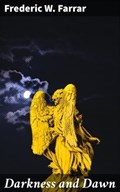In "Darkness and Dawn," Frederic W. Farrar embarks on a profound exploration of the human condition, deftly weaving together themes of faith, endurance, and redemption in a narrative set against the backdrop of a world steeped in turmoil. Farrar employs a richly descriptive literary style, combining lyrical prose with philosophical introspection, reminiscent of Victorian literature's deep moral inquiry. The novel's allegorical elements invite readers to ponder the struggles between light and darkness, both in the external world and within the inner psyche of its characters, making it a poignant commentary on the societal challenges of his time and the eternal quest for meaning. Frederic W. Farrar was an eminent Victorian cleric, scholar, and author whose rich tapestry of experiences as a theologian and educator profoundly shaped his writing. His deep understanding of Christian theology and human psychology is intricately woven into "Darkness and Dawn," as he aims to bridge the spiritual and temporal worlds. Farrar'Äôs contemplative approach reflects both his pastoral care and intellectual rigor, offering a unique lens through which to view the dilemmas faced by humanity. This book is highly recommended for those seeking a thought-provoking narrative that challenges the reader to confront moral dilemmas while providing a captivating story. Its timeless themes resonate with today's societal struggles, making "Darkness and Dawn" not just a work of fiction, but a compelling call for introspection and hope.

